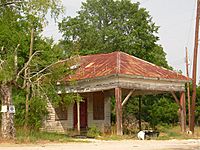Marvyn, Alabama facts for kids
Quick facts for kids
Marvyn, Alabama
|
|
|---|---|

Marvyn's abandoned service station located at the intersection of Alabama Highway 51 and U.S. Highway 80.
|
|
| Country | United States |
| State | Alabama |
| County | Lee |
| Elevation | 499 ft (152 m) |
| Time zone | UTC-6 (CST) |
| • Summer (DST) | UTC-6 (EDT) |
| GNIS feature ID | 122351 |
Marvyn, sometimes spelled Marvin, is a small, unincorporated community in southern Lee County, Alabama, United States. An unincorporated community means it's a place with a shared identity but no local government.
Marvyn is located where two important roads meet: Alabama Highway 51 and U.S. Highway 80. It's also part of the larger Columbus, Georgia-Alabama Metropolitan Area.
Contents
Marvyn's Past: A Brief History
Marvyn wasn't always in Lee County. It was first located in Russell County. In 1923, Marvyn became part of Lee County. This happened as part of a land exchange that also involved Phenix City.
Interestingly, a specific type of soil is named after Marvyn. This is because scientists first studied and described this soil in the Marvyn area.
Where is Marvyn? Geography and Location
Marvyn is found where U.S. Highway 80 and Alabama State Route 51 cross paths. This is in the southern part of Lee County.
If you travel east on US-80, you'll reach Phenix City about 22 miles (35 km) away. If you go west on US-80, Tuskegee is also about 22 miles (35 km) away.
Using AL-51, Opelika is 15 miles (24 km) to the north. Opelika is the main city and county seat of Lee County. Going south on AL-51 will take you to Hurtsboro, which is also about 15 miles (24 km) away.
How Many People Lived in Marvyn? Demographics
| Historical population | |||
|---|---|---|---|
| Census | Pop. | %± | |
| 1880 | 241 | — | |
| U.S. Decennial Census | |||
The word "demographics" refers to information about a population, like how many people live in a place. Marvyn appeared in the U.S. Census in 1880. At that time, 241 people lived there.
This was the only time Marvyn was listed as a separate community in the census. Back then, it was still part of Russell County.
See also
 In Spanish: Marvyn (Alabama) para niños
In Spanish: Marvyn (Alabama) para niños



